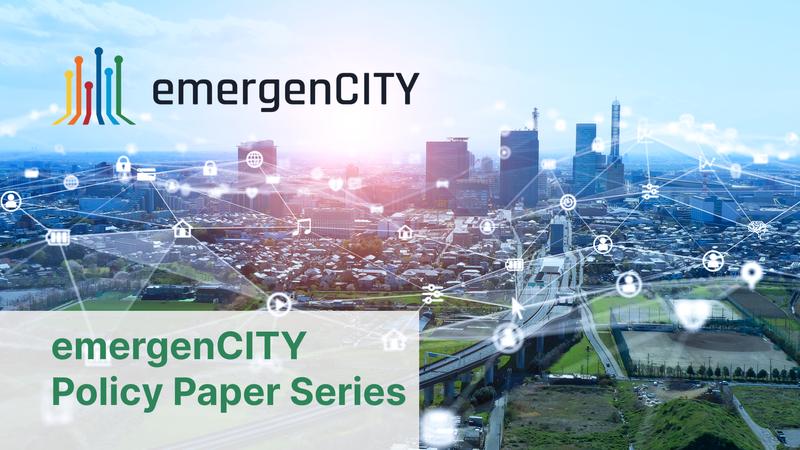They are the flagship publications of emergenCITY’s interdisciplinary research work: The emergenCITY Policy Papers negotiate directional results from resilience and disaster research, not only for a scientific community. As cross-disciplinary position papers, they also set the tone and fundamental cornerstones for current debates and decisions in crisis and disaster management.
Five papers have appeared so far in the context of this publication series. They are now all available for download and citation on the emergenCITY website in a revised design for free now. Jointly developed by different emergenCITY research leaders, they present analyses and recommendations for action on a wide range of topics.
PP1 - Resilient Information and Communication Technology
by Matthias Hollick, Jens Ivo Engels, Cornelia Fraune, Bernd Freisleben, Gerrit Hornung, Michèle Knodt and Max Mühlhäuser
Information and communication technology (ICT) plays a crucial role in the response to and ongoing management of crises. Policy Paper 1 presents reasons for the increasing fragility and decreasing resilience of ICT and suggests recommendations for increasing and sustainably ensuring the resilience of current and future ICT. In the view of the emergenCITY researchers, ICT can only be described as resilient if it can maintain an acceptable minimum or substitute functionality despite significant impairments and if it is equipped for a rapid return to normal behavior.
PP2 - Crisis-proof through Dark Times
by Michèle Knodt and Alice Knauf
Human or technical failure, natural disasters, pandemics, cyber or terrorist attacks can lead to a nationwide power outage in Germany that lasts longer than 24 hours. Cities are then faced with the challenge of having to react in order to successfully bridge the crisis. Policy Paper 2 examines the measures taken by the local disaster control offices of major German cities in response to this scenario. In addition, the emergenCITY researchers show further options for action on how cities can be better prepared for a long-lasting supra-regional power outage in the future.
See the Paper (English Abstract)
PP3 - Coordination in Disaster Management
by Prof. Michèle Knodt and Eva Katharina Platzer
Current disaster incidents, such as the heavy rainfall event in the Ahr Valley in summer 2021, are opening up new debates on how cooperation between emergency services in German civil protection and disaster management can be better coordinated. The policy paper 3 analyzes current weaknesses in disaster management. The emergenCITY researchers also provide recommendations on how coordination processes between those involved in disaster management can be improved in direct response to and management of a crisis situation.
See the Paper(English Abstract)
PP4 - Cooperative Resilience
by Michèle Knodt, Alice Engel, Sonja Petersen, Marie Kluge, Christine Quittkat and Hans-Joachim Linke
Successful urban disaster management requires cooperation between authorities, organizations, companies and the population. Participation plays a central role here, as the early involvement of stakeholders increases the quality and acceptance of decisions. Policy Paper 4 shows different levels of participation and the ideal-typical sequence of a cooperative participation process for the development of a crisis management plan. The emergenCITY researchers emphasize that co-creation processes are crucial for increasing the resilience of cities and overcoming crises.
See the Paper(English Abstract)
PP5 - Resilience in Digitalized Agriculture
by Franz Kuntke and Christian Reuter
The dependency of agricultural businesses on communication and energy infrastructure is increasing, but the impact of this current trend on the resilience of the sector remains unclear. Policy Paper 5 takes a critical perspective on specific security risks in the ongoing digitalization and increasing importance of data in agriculture. The emergenCITY researchers emphasize that improved security and resilience to infrastructure failures and the protection of data are essential for digitalization to sustainably improve the situation of farms.



